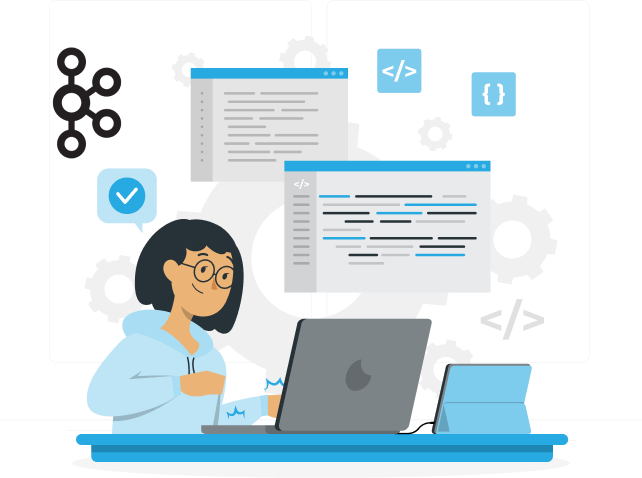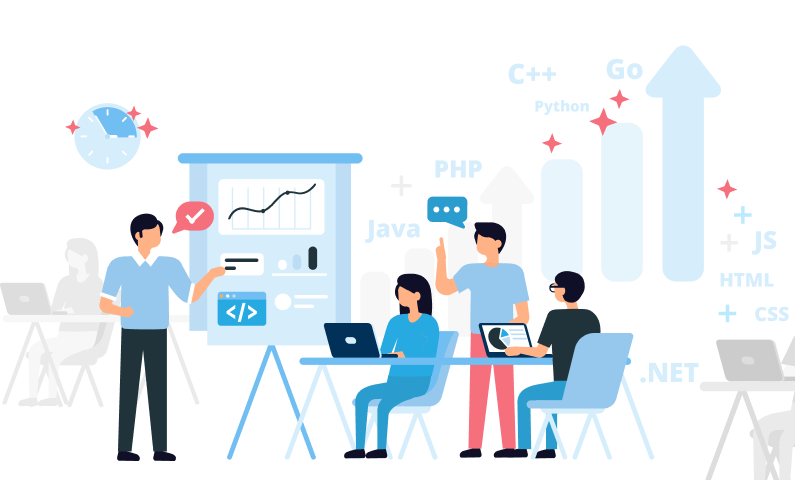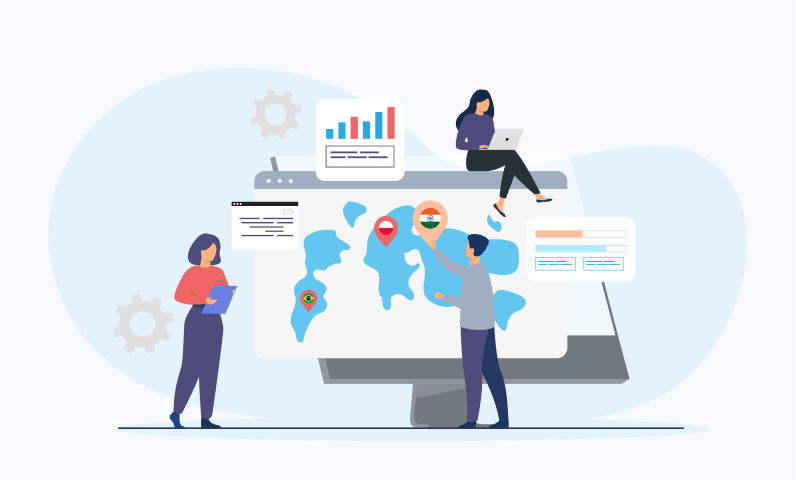Technology in business across various industries are transforming fast within the rapidly advancing world of today. From AI and automation to cloud computing and blockchain, modern technologies aren’t just enhancing operations but are fundamentally reshaping how businesses interact with customers, manage resources, and scale for growth.
Hence, it is imperative for one to understand how technology impacts business for success in the digital age. It profoundly impacts the operations of businesses with the emergence of new efficiencies, innovation, and revenue models. Let us proceed and find out how the current modern technologies shape the future of business.
Effects of Technology in Business:
1. Rapid Technological Advancement in Business
The rapid growth of technological advancements in business is reshaping how organizations operate and deliver products and services. The recent boom of the internet, cloud computing, and AI has opened up the horizon of tools that companies may not have been able to reach before. The high pace of change calls upon businesses to adopt new technologies at a fast pace or risk being left out.
Real-time Use Case:
Amazon’s case in the use of AI and machine learning on their e-commerce platform shows how companies apply technology to grow. Here, Amazon constantly updates a recommendation engine, using data about its customers to give them recommendations; hence, sales are greatly improved. This focus on AI makes the company scale well and respond to market needs quickly.
Impact:
As businesses embrace new technologies, the need for agility becomes more important. Companies that do not innovate may become left behind, while companies embracing change can use these tools to achieve long-term growth and sustainability.
2. How Does Technology Impact Business?
The effects of technology on business are very wide-ranging and transformative. Technologies such as cloud computing, automation, and AI have helped businesses improve efficiency, reduce costs, and enhance decision-making. Businesses can now automate repetitive tasks, freeing human capital for more strategic work. Additionally, technologies such as data analytics allow businesses to understand consumer behavior and make informed decisions.
Real-time Example:
Domino’s Pizza has utilized technology to change the face of ordering. One can order pizza fast, track deliveries, and even place an order using voice commands on its mobile app. The use of technology does not only improve customer experience but also operational efficiency through optimizing delivery.
Pros:
Technology helps businesses to reach the customer more effectively, deliver personalized experiences, and provide insight into consumer behavior. In doing so, businesses are able to operate in a more efficient manner, cut costs, and innovate more quickly.
3. The Future of Business: Digital Transformation
The future for a business holds to include embracing more technological innovations, like embracing digital transformation in modern business practices. Businesses shift more to becoming digital-first from their traditional models, indicating changing operations to ways they work in innovating and delivering services to the customer.
Future times would call for enhancing collaboration between workers, boosting efficiency among people engaged directly in operation, and improving the consumer’s experience at hand.
Real-time Use Case:
The transformation of traditional car companies such as General Motors (GM) shows how established businesses are adopting digital tools to stay competitive. GM is transitioning into a more digital and electric-first company, investing heavily in electric vehicles and autonomous driving technology. This shift positions GM as a key player in the future of mobility.
Impact:
Digital transformation is not just about upgrading technology—it’s about shifting the company’s mindset and culture. Businesses that adopt digital-first approaches will be able to respond more quickly to customer demands and market changes, improving their competitive position in the long run.
4. Effects of Technology on Business: Innovation and Automation
This rise in innovation and automation impacts businesses because of automation’s role in transforming industries. For example, the elimination of repetitive work decreases human errors that occur due to repeated actions. Businesses, therefore, can direct their time and energy toward creative and strategic work. Additionally, technology aids innovation in allowing new business models, products, and services to flourish.
Real-time Example:
For instance, the manufacturing industry has witnessed much innovation in it due to automation. Companies like Tesla have integrated robots and automation into their production lines to manufacture cars more efficiently and accurately. This automation reduces costs, improves product quality, and increases production speed.
Advantage:
Technology accelerates innovation as it shortens the time of product development from an idea to a live market. Automation is allowed to scale up quickly on business operations, thus easily providing products and services to a large segment of people. The ability to deliver goods and services increases the chances of competing companies in the rapidly changing market.
5. Data-Driven Business Strategies
Data is a very precious resource that businesses are using to make smarter decisions. Technologies such as Big Data and analytics platforms allow businesses to analyze huge volumes of data and extract actionable insights. This information allows companies to optimize operations, predict trends, and produce better customer experiences.
Real-time Example:
Netflix uses Big Data to analyze viewing habits. It can, therefore, personalize recommendations for users and create original content that will align with the preferences of the audience. This data-driven approach has helped Netflix to maintain its leadership in the streaming industry.
Impact:
Data-driven decision-making allows businesses to anticipate consumer needs, tailor marketing efforts, and improve operational performance. Through data, companies can identify opportunities for growth and innovation, hence giving them a competitive advantage.
6. Cloud Computing and Its Impact on Business Flexibility
Cloud computing is probably the most revolutionary technology in modern business. It enables companies to store data remotely and gain access to software and services over the Internet. Not only does this reduce expensive on-premise infrastructure needs but also allows businesses to scale their operations without requiring a great amount of upfront capital expenditure.
Real-time Example:
Dropbox is the quintessential example of how cloud computing has revolutionized business operations. With the ability to provide cloud-based storage services, Dropbox offers its users the flexibility of accessing, sharing, and collaborating on files from any corner of the world, thereby enabling a flexible and mobile workforce.
Benefit:
The impact of cloud computing on business is very massive. The benefits include scalability, cost-cutting, and easy remote access to business tools. On the other hand, businesses can easily adopt new software solutions and tools without worrying about infrastructure because it gives them a great way to grow very quickly.
7. How Does Technology Affect Business Operations?
Technology impacts business operations by streamlining workflows, increasing productivity, and fostering collaboration. For example, automation will allow the business to carry out many tasks like issuing invoices, payroll, and customer service. Cloud-based collaboration tools, such as Slack and Microsoft Teams, let employees work collaboratively on the go and in real-time.
Real-time Example:
Shopify has revolutionized e-commerce with cloud-based solutions. Now anyone can create and manage an online store. Built-in payment gateways, inventory management, and shipping solutions make Shopify help business owners operate their stores more efficiently.
Impact:
Technology affects the operations of businesses significantly by reducing operational costs, improving communication, and increasing overall productivity. This allows businesses to focus on their core competencies and growth strategies while leaving repetitive tasks to automation.
8. Blockchain and Its Effect on Business Security
Blockchain technology is revolutionizing the way businesses approach security, especially in finance, healthcare, and logistics. It allows for decentralized and secure data storage and sharing, ensuring transparency and reducing fraud risk.
Real-time Example:
IBM’s Food Trust blockchain helps track food products from the farms to the table. It gives full assurance and authenticity to every food product. Now with this blockchain, consumers can trace their food origin, reducing fraud with improved transparency in supply.
Benefit:
Blockchain has improved security, data integrity, and transparency for businesses. With blockchain, companies reduce the chances of fraud and increase their mutual trust with customers and their partners.
9. Internet of Things in Business
The Internet of Things is also a technology that is changing the ways businesses operate. IoT devices can collect and share information in real time, which allows businesses to monitor operations and make appropriate decisions. This has, for instance, led to innovation in healthcare, logistics, and manufacturing industries.
Real-time Example:
General Electric uses its manufacturing plants to monitor machinery in real-time, predicting when equipment needs maintenance. Such action reduces downtime, increases productivity, and portrays how IoT is changing industrial sector operations.
Impact:
It will provide deep insight into operations for business, efficiency enhancement, and cost savings. Also, new business models and revenues are now possible through predictive maintenance services.
10. AI and ML for Improving Customer Experience
AI and machine learning help businesses enhance customer experience by offering personalized services and improving customer support. For example, AI-driven chatbots can help customers 24/7, answering their questions and solving problems in real time.
Real-time Example::
H&M uses AI to analyze the shopping patterns of customers and offer them outfits that are tailored to their needs, thereby making the online shopping experience better. The company’s AI-powered chatbot, Ada, also helps solve customer queries efficiently, thus improving the satisfaction level of customers.
Impact:
AI and machine learning allow businesses to provide customers with personalized, responsive, and efficient customer service. This boosts customer satisfaction, but more importantly, it increases customer loyalty and repeat business.
11. Role of 5G in Business Innovation
The rollout of 5G technology will change industries with faster internet speeds, lower latency, and better connectivity. Businesses will then be able to deploy new technologies such as augmented reality (AR), virtual reality (VR), and real-time data analytics at scale.
Real-time Example:: Verizon is already using 5G to enable smart city projects, improving infrastructure management and delivering better services to citizens. The ability to connect millions of devices in real time will open up new opportunities for businesses to innovate and provide new services.
Benefit:
5G will enable the business to enhance operational efficiency, further improve customer experience, and explore new business models driven by high-speed connectivity. This will lead to faster decision-making processes and more real-time interactivity between businesses and customers.
Conclusion: Embracing Technology for Business Growth
Modern technology changes and has transformed every business aspect; from operations to customer experiences. The effects of technological advancements on business are powerful, allowing companies to achieve greater efficiency, deliver tailor-made services, and provide innovative products. Businesses are thus compelled to embrace new chances the technologies in question offer them to become stronger competitors.
Key Takeaways:
Businesses in the future will be the ones that have the ability to adjust to new technologies, apply them to their operations, and leverage these to build better experiences for their customers. In a rapidly changing business environment, technology is key to success, and companies that fail to innovate may end up at the bottom. Now is the time to act.
If you are a business looking to enhance your operations by implementing advanced technologies, we are here to help you with it. Let’s speak!

Start a Project with Ajackus











































































